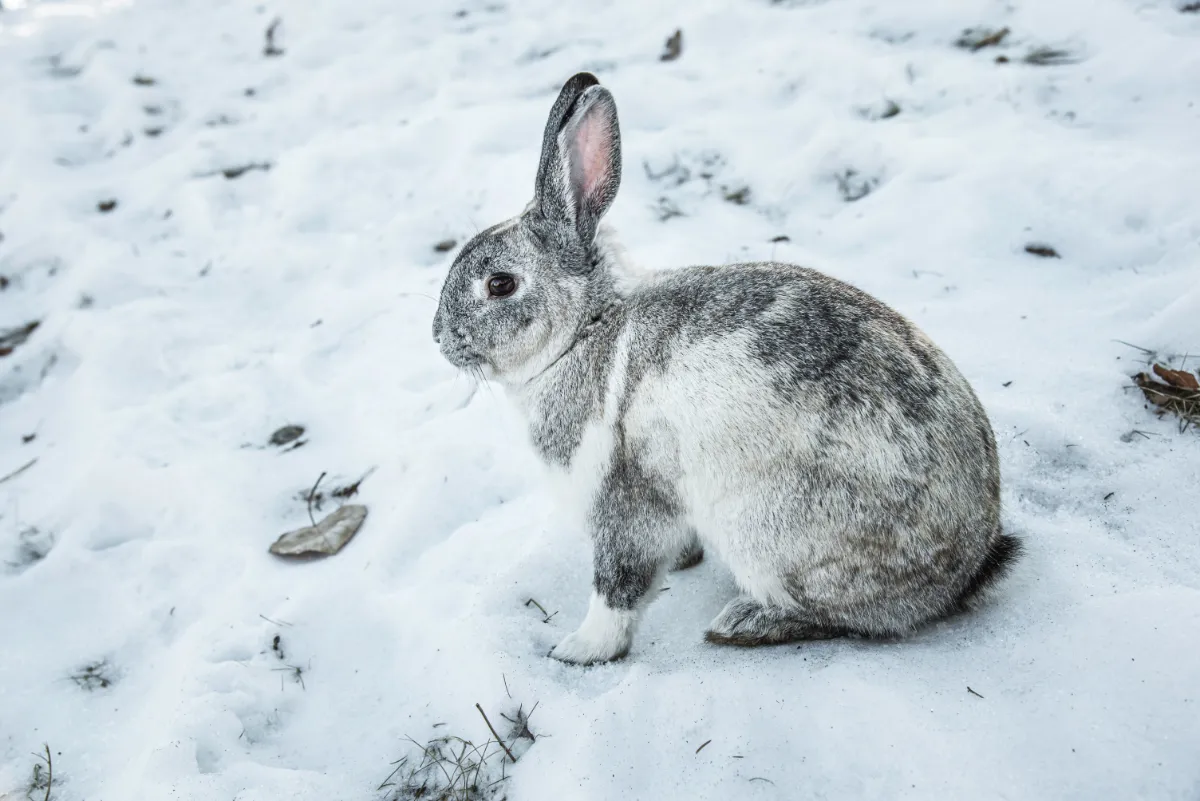Do you know when the chill becomes too much for your furry friend? Discover the ideal temperature range for rabbits and learn how to recognize signs of cold stress.
Understand your rabbit’s cold tolerance and find out how to prepare their living space for winter.
With these tips, you’ll be able to keep your rabbit warm and cozy during the cold weather. Stay tuned to learn about essential winter care for your beloved pet.
In This Article
- 1 Key Takeaways
- 2 The Ideal Temperature Range for Rabbits
- 3 Recognizing Signs of Cold Stress in Rabbits
- 4 Understanding Rabbit’s Cold Tolerance
- 5 Preparing Your Rabbit’s Living Space for Winter
- 6 Tips for Keeping Your Rabbit Warm in Cold Weather
- 7 Winter Care Essentials for Rabbits
- 8 Frequently Asked Questions
- 8.1 Can Rabbits Hibernate in Extreme Cold Temperatures?
- 8.2 How Can I Tell if My Rabbit Is Too Cold?
- 8.3 Can Rabbits Survive in Outdoor Temperatures Below Freezing?
- 8.4 Should I Bring My Rabbit Indoors During the Winter?
- 8.5 Are There Any Specific Breeds of Rabbits That Are More Cold-Tolerant Than Others?
- 9 Conclusion
Key Takeaways
- Rabbits have a natural fur insulation that helps them stay warm in colder weather.
- Outdoor rabbits should have a shelter that protects them from wind and rain.
- Regularly monitor behavior and body temperature to ensure comfort and safety.
- Providing a cozy shelter with bedding can help keep rabbits warm in cold weather.
The Ideal Temperature Range for Rabbits
You should keep your rabbit in an ideal temperature range to ensure its well-being. Maintaining the right temperature for your furry friend is crucial, especially during the cold winter months. When it comes to rabbits, their winter coat plays an essential role in keeping them warm.
Contrary to popular belief, a winter coat is necessary for rabbits in cold weather. It provides insulation and protects them from the harsh elements. However, it’s important to note that not all rabbits have the same tolerance for cold temperatures. Some may handle the cold better than others.
If you have an outdoor rabbit, it’s recommended to provide them with a shelter that offers protection from wind and rain. On the other hand, indoor rabbits have the advantage of being in a controlled environment, which makes it easier to maintain the ideal temperature range.
Ultimately, it’s up to you to decide whether your rabbit is better off indoors or outdoors during the cold weather, based on their individual needs and preferences.
Recognizing Signs of Cold Stress in Rabbits
Make sure to closely observe your rabbit for any signs of cold stress during the winter months, as these can indicate that they aren’t handling the cold temperatures well. Rabbits are more susceptible to cold-related health issues, such as frostbite and hypothermia, so it’s important to take necessary precautions to keep them safe and comfortable.
Here are some signs of cold stress to watch out for:
- Shivering or trembling
- Hunched posture
- Cold ears and nose
- Reduced activity level
- Loss of appetite
To prevent frostbite risks and hypothermia in rabbits, consider the following:
- Provide plenty of warm bedding, such as hay or straw, in their living area.
- Ensure their housing is well-insulated and protected from drafts.
- Limit their exposure to cold weather by keeping them indoors or providing a sheltered area outdoors.
Understanding Rabbit’s Cold Tolerance
Sometimes, rabbits can tolerate cold temperatures, but it’s important to understand their limits and provide appropriate care to keep them safe.
Rabbits have a natural fur insulation that helps them stay warm in colder weather. Their fur acts as a barrier, trapping air close to their bodies and providing insulation.
However, it’s crucial to remember that rabbits are more susceptible to extreme temperatures than other animals. When the temperature drops below freezing, it becomes necessary to manage their body temperature.
Providing a cozy shelter with bedding, such as straw or hay, can help keep them warm. You can also consider using heat pads or blankets, but be cautious to prevent any burns or overheating.
Regularly monitor your rabbit’s behavior and body temperature to ensure they’re comfortable and safe. By understanding their fur insulation and managing their body temperature, you can help your rabbit stay warm even in cold weather.
Preparing Your Rabbit’s Living Space for Winter
To ensure your rabbit stays warm during the winter, consider adding extra insulation to their living space and regularly checking for any drafts, as these can make the temperature drop too low for their comfort. Rabbits are susceptible to the cold and can easily become chilled if their living space isn’t adequately protected.
Here are some tips to help you prepare your rabbit’s living space for winter:
- Insulating hutches:
- Line the hutch with insulating materials such as straw or blankets to provide an extra layer of warmth.
- Consider using hutch covers or tarps to protect the hutch from wind and rain.
- Providing extra bedding:
- Increase the amount of bedding in the hutch to provide additional insulation.
- Use materials like hay or shredded paper, which can help trap heat and keep your rabbit cozy.
Tips for Keeping Your Rabbit Warm in Cold Weather
Remember, a warm and cozy shelter is essential for your rabbit’s well-being during cold weather. When it comes to keeping your rabbit warm, there are a few important factors to consider.
First, ensure that the hutch or cage is properly insulated. This can be achieved by using insulating materials such as straw or hay, which provide additional warmth.
Additionally, consider providing your rabbit with heating options. Heat lamps or heat pads specifically designed for small animals can be used to provide extra warmth during extremely cold temperatures.
It’s important to monitor the temperature inside the shelter regularly to ensure it remains at a comfortable level for your rabbit. Remember, rabbits are sensitive to extreme temperatures, so it’s crucial to take steps to keep them warm and comfortable during cold weather.
Winter Care Essentials for Rabbits
When it gets cold outside, make sure to provide your rabbit with a warm shelter and plenty of bedding to keep them cozy during the winter months. Rabbits are sensitive to extreme temperatures and can suffer from hypothermia if not properly cared for in cold weather.
Here are some essential tips to help you take care of your rabbit during the winter:
- Winter Grooming:
- Regularly brush your rabbit’s fur to remove excess hair and prevent matting.
- Avoid bathing your rabbit during winter as wet fur can lead to hypothermia.
- Winter Diet:
- Increase the amount of hay in your rabbit’s diet as it helps to keep them warm and aids in digestion.
- Provide fresh vegetables and fruits as a source of hydration and essential nutrients.
Frequently Asked Questions
Can Rabbits Hibernate in Extreme Cold Temperatures?
Rabbits can hibernate in extreme cold temperatures, but it’s important to provide them with adequate shelter. Understanding rabbit hibernation patterns in different climates helps ensure their well-being.
How Can I Tell if My Rabbit Is Too Cold?
If your rabbit is too cold, signs of hypothermia may include shivering, lethargy, and cold ears. Ensure proper rabbit winter care by providing a warm shelter, blankets, and monitoring their body temperature.
Can Rabbits Survive in Outdoor Temperatures Below Freezing?
Can rabbits survive in freezing temperatures? Yes, they can. However, it’s important to provide them with proper winter care. Keep them in a cozy shelter, provide insulation, and make sure they have access to fresh water and food.
Should I Bring My Rabbit Indoors During the Winter?
You should bring your rabbit indoors during the winter to ensure their safety and well-being. Rabbit care tips for winter include creating a warm and cozy environment to protect them from the cold.
Are There Any Specific Breeds of Rabbits That Are More Cold-Tolerant Than Others?
If you’re wondering about cold-tolerant rabbit breeds, some like the Alaska and the Siberian can handle colder temperatures. To keep rabbits warm in winter, provide insulated shelter and bedding.
Conclusion
In conclusion, it’s crucial to ensure that rabbits are kept within their ideal temperature range as they’re highly sensitive to cold weather. Recognizing signs of cold stress and understanding their cold tolerance can help us provide the necessary care for our furry friends.
By preparing their living space for winter and following essential winter care tips, we can ensure that our rabbits stay warm and cozy. Remember, keeping a rabbit warm is like wrapping them in a snug blanket on a chilly winter night.





